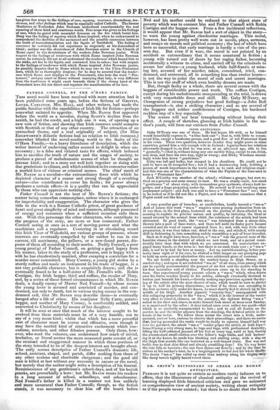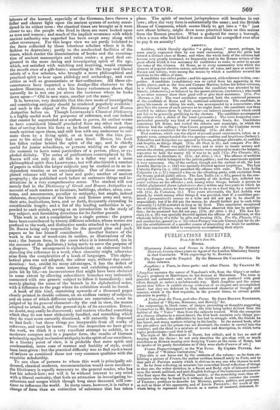DR. SMITH'S DICTIONARY OF GREEK AND ROMAN ANTIQUITIES.
PERHAPS it is not quite so certain as modern vanity induces us to affirm, that the illustrators of classical antiquity at the revival of learning displayed little historical criticism and gave no animated or comprehensive view of ancient society, writing about antiquity as if the people never existed ; but there is no doubt that the later
labours of the learned, especially of the Germans, have thrown a fuller and clearer light upon the ancient system of society consi- dered in its widest term : the classical times are brought as it were closer to us; the people who lived in them are more looked upon as men and women ; and much of the implicit reverence with which ancient authority was regarded has been swept away along with other reverences. For this larger view we are partly indebted to the facts collected by those laborious scholars whom it is the fashion to depreciate; partly to the mechanical facilities of the times, which render the dissemination of books and the examina- tion of ancient manuscripts and ruins easier ; a good deal ori- ginated in the more daring and investigating spirit of the age, which, not satisfied with watching and receiving, would examine the mouth even of a gift-horse ; something in the large and liberal minds of a few scholars, who brought a more philosophical and practical spirit to bear upon philology and archaeology, and were critics as well as grammarians or fact-collectors. All these cir-
cumstances have imparted a less drudge-like character to the modern illustrator, even when his heavy verboseness shows that naturally he is not one jot above the variorum whom he looks down upon—" Old in new state, another yet the same."
It is, however, very desirable that this new mode of investigating and considering antiquity should be rendered popularly available :
and such is the object of the Dictionary of Greek and Roman Antiquities before us. Though LEMPRIERE'S Classical Dictionary is a highly useful work for purposes of reference, and one indeed that cannot be superseded as a multum in paruo, its author seems
to have considered himself precluded from any other task than that of setting down his facts as he found them, without passing much opinion upon them, and still less with any endeavour to ani-
mate them by a living spirit, or at least with the idea pre- sent to his mind that they had once lived. Hence, his book has fallen rather behind the spirit of the age, and is chiefly useful for junior schoolboys, or persons wishing on the spur of the moment to learn some particulars of a person, place, or ex- ploded divinity. The series of publications contemplated by Dr. SMITH will not only do all this in a fuller way and a more philosophical spirit than LEMPRIERE, but will also furnish a number of papers in which the larger subjects may be studied as in an in- dependent treatise or an encyclopaedia. One of these contem- plated volumes will treat of men and gods ; another of ancient geography ; the published work before us embraces things and in- stitutions in a very comprehensive sense. The student will not merely find in the Dictionary of Greek and Roman Antiquities an account of such matters as furniture, buildings, clothes, arms, cus- toms, and amusements, peculiar to antiquity, but ample, indeed elaborate, descriptions of the Greek and Roman army and navy, their arts, institutions, laws, and so forth, frequently extending to considerable length ; and a list of the leading authorities is ap- pended to each article, serving as an introduction to the study of any subject, and furnishing directions for its further pursuit. This work is not a compilation by a single person : the papers have been contributed by twenty different scholars, whose names are prefixed to the work, and distinctive marks attached to each paper; Dr. Sails being only responsible for the general plan and such papers as he has himself contributed. Another feature of the work is the use of wood-cuts in outline, as illustrations of the text ; the human form, in the cases when it is introduced, (as in the account of the gladiators,) being made to serve the purpose of a diagram. The arrangement is alphabetical; an elaborate index directing the reference to a word, when obscurity might otherwise arise from the complexities of a leash of languages. This alpha- betical plan was not adopted, the editor says, without due consi- deration : but, amidst its many advantages, it has the defect of separating things of the same nature and exhibiting certain sub- jects bit by bit,—an inconvenience that might have been obviated to some extent by allowing subordinate branches very intimately connected with one generic subject to follow it immediately ; and merely placing the name of the branch in its alphabetical order, with a reference to the page where its exhibition would be found. A book of this kind, containing upwards of a thousand pages closely printed in double column, on an endless variety of subjects, and on some of which different opinions are entertained, must be judged of by its general character—by the end in view, the means adopted to attain it, and the general style of its execution. Errors, no doubt, may easily be discovered; and readers who find something which they do not want elaborately handled, and something which they do want more cursorily dismissed, will naturally be disposed to find fault : but these things are inseparable from all works of reference, and must be borne. From the inspection we have given the work, we think it a very excellent attempt to exhibit, in a moderate compass and in a popular form, the results of German scholarship applied to classical antiquity in the spirit of our own times. In a literary point of view, it is probable that more spirit and condensation, more ease of manner and lucidity of style, could have been given : but the practical difficulty was to find such a band *writers as combined these not very common qualities with the requisite scholarship. To one class of persons to whom this work is principally ad- dressed, classical students, recommendation would seem needless : the Dictionary is equally necessary to the general reader, who has lost his school-lore ; nor will it be without interest to any mind with a liberal curiosity, that feels an attraction in investigating in- stitutions and usages which though long since deceased still con- tinue to influence the world. In many cases, however, it is rather a change of form than an extinction of substance that has taken place. The spirit of ancient jurisprudence still breathes in our laws ; often the very form is substantially the same ; and the British House of Commons, which seems likely to get into a " fix" just now about bribery, might draw some practical hints on this matter from the Roman practice. What a godsend for many a borough, when a man who had bribed it once should be compelled ever after to pay it an annuity !
AMBITUS.
Ambitus, which literally signifies " a going about," cannot, perhaps, be more nearly expressed than by our word canvassing. After the plebs had formed a distinct class at Rome, and when the whole body of the citizens had become very greatly increased, we frequently read in the Roman writers of the great efforts which it was necessary for candidates to make in order to secure the votes of the citizens. At Rome, as in every community into which the element of popular election enters, solicitation of votes, and open or secret in- fluence and bribery, were among the means by which a candidate secured his election to the offices of state.
A candidate was called petitor ;and his opponent, with reference to him, com- petitor. A candidate (candidatus) was so called from his appearing in the public places, such as the fora and Campus Martins, before his fellow-citizens, in a whitened toga. On such occasions the candidate was attended by his friends, (deductores,) or followed by the poorer citizens, (sectatores,) who could in no other manner show their good-will or give their assistance. (Cic. Pro Murena, c. 34.) The word assiduitas expressed both the continual presence of the candidate at Rome and his codtinual solicitations. The candidate, in going his rounds or taking his walk, was accompanied by a nomenclator, who gave him the names of such persons as he might meet ; the candidate was thus enabled to address them by their name—an indirect compliment which could not fail to be generally gratifying to the electors. The candidate accompanied his address with a shake of the hand (prensatio.) The term benignitas com- prehended generally any kind of treating, as shows, feasts, &c. Candidates sometimes left Rome, and visited the colonise and municipia, in which the citizens had the suffrage ; thus Cicero proposed to visit the Cisalpine towns when he was a candidate for the Consulship. (Cic. Ad Attic. i. 1.) That ambitus, which was the object of several penal enactments, taken as a generic term, comprehended the two species—ambitus and largitiones (bribery). Liberalitas and benignitas are opposed by Cicero, as things allowable, to ambitus and largitio, as things illegal. (Cic. De Orat. ii. 25; and compare Pro Mo- rena, c. 36.) Money was paid for votes; and in order to insure secrecy and secure the elector, persons called interpretes were employed to make the bargain, sequestres to hold the money till it was to be paid (Cic. Pro Cluentio. 26), and divisores to distribute it. (Cic. Ad Attic. i. 16.) The offence of ambitus was a matter which belonged to the judicia publica; and the enactments against it were numerous. One of the earliest, though not the earliest of all, the Lex Aemilia Baebia (B. c. 182) was specially directed against largitiones. The Lex Cornelia Fulvia (a. c. 159) punished the offence with exile. The Lex Acilia Calpurnia (a. c. 67) imposed a fine on the offending party, with exclusion from the Senate and all public offices. The Lex Tullis (u. c. 63), passed in the con- sulship of Cicero, in addition to the penalty of the Acilian law, inflicted ten years' exilium on the offender ; and, among other things, forbade a person to exhibit gladiatorial shows (gladiatores dare) within any two years in which he was a candidate, unless he was required to do so on a fixed day, by a testator's will. (Cic. In Vatinium, 15.) Two years afterwards, the Lex Anfidia was passed, by which among other things it was provided, that if a candidate pro- mised (pronuntiavit) money to a tribe and did not pay it, he should be unpunished; bat if he did pay the money, he should further pay to each tribe (annually ?) 3,000 sesterces as long as he lived. This enactment occasioned the witticism of Cicero, who said that Clodius observed this law by anticipa- tion ; for he promised but did not pay, (Cie. Ad Attic. i. 16.) The Lex Li- cinia (B. c. 58) was specially directed against the offence of sodalitium, or the wholesale bribery of a tribe by gifts and treating (Cic. Pro Ca. Plancio, 15); and another lex, passed (n. c. 52) when Pompey was sole Consul, had for its ob- ject the establishment of a speedier course of proceeding on trials for ambitus. All these enactments failed in completely accomplishing their object.



























 Previous page
Previous page